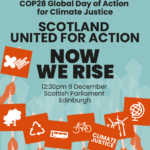By Mike Robinson, Chair of Stop Climate Chaos Scotland
World leaders, negotiators, activists and journalists are currently in Dubai for the COP28 climate talks at the end of what will soon be confirmed as the hottest year ever recorded. Increasingly extreme weather is devastating lives and livelihoods across the world, with emissions and temperatures continuing to rise. With current international climate pledges failing to keep the planet below 2 degrees of heating, we need COP28 to step up – to break our perilous reliance on fossil fuels and to deliver much-needed financial support to people around the world who are suffering its worst impacts.
The lead up to the event exposed issues which shows the COP process itself is in serious jeopardy. A global problem like climate change needs a global solution and agreement, with everybody pulling in roughly the same direction and collaborating as much as possible. The COP process has always been glacially slow, and is susceptible to being held up by the most reluctant laggards, due to any international agreement relying on all parties committing to act.
The fact that we’re currently having COP28 – the 28th annual meeting to discuss progress, and we’re still seeing emissions rise year on year, does rather underline the clunky lethargy in decision making. Every year that passes and every year that fails puts more and more and more pressure on future COPs, and it’s starting to feel increasingly desperate.
With this year’s talks being hosted by one of the world’s biggest exporters of fossil fuels, many are very doubtful that we will end up with agreements anywhere near what is needed on reducing emissions. There are deeply concerning reports that the talks are being used as a vehicle to promote its oil interests with other nations, stretching trust in the process to breaking point. However, with the Middle East being one of the regions already experiencing some of the most severe impacts of climate change, with soaring temperatures, water shortages and increasing desertification, its people have an existential need to address the issue.
As if the controversy around COP28 wasn’t enough, next year’s talks are also in jeopardy because the UN cannot get agreement on which country should host. According to the UN rules, it should be somewhere in what was the Eastern Europe Bloc, but Russia, one of the biggest climate laggards, is blocking that agreement, leaving COP29 currently homeless. The United Nations needs to take a long hard look at the process.
These are hugely unwelcome distractions during a vital negotiation that needs all the attention and focus it can get on delivering progress.
With this background it is more vital than ever that Scotland continues to play a role in demonstrating leadership on the world stage and pushes ahead with action at home. The First Minister has confirmed his commitment to strong climate action, but we are yet to see this translate into sufficient investment in the actions needed to reduce emissions quickly and fairly here in Scotland.
COP28 therefore presents a key test of Scotland’s climate credibility on the world stage, and to protect this the Scottish Government should get on with the things they can do now, such as reforming the funding system for agriculture, accelerating peatland restoration, making our homes warmer, and enabling more sustainable transport options.
In addition, Scotland can bolster the leadership it has shown at previous COPs by committing to raise new money for climate finance by making the biggest polluters pay, backing the development of the Fossil Fuel Non-Proliferation Treaty, and raising global ambition on the need to deliver a just transition.
It is not an easy job to bring the world’s governments together to make any sort of agreement, but maybe this process is just simply not fit for purpose. We need to look elsewhere for leadership and not leave all our eggs in this one basket, especially if we want progress at pace. Smaller, more achievable agreements that add up rather than one big agreement that doesn’t appear to be. A framework of co-ordinated and vibrant global discussions, not the stultifying behemoth that COP has become, and not one in which the worst trouble makers are handed the reins to steer us out of trouble.


